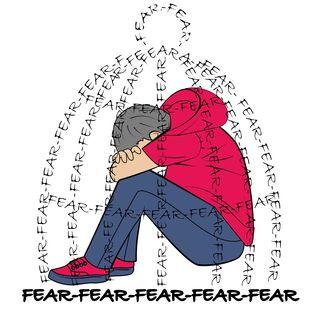Adolescence
Sheltering a Teen in Place Without Losing Your Mind
How to keep teens safe and sane during the challenging days ahead.
Posted March 17, 2020 Reviewed by Ekua Hagan

These difficult and uncertain times present a unique challenge to parents. Almost overnight, your teen lost what they value most—their autonomy, independence, and social connection. They may also feel adrift without a structure or routine. And of course, they too are worried about what the future might bring.
Here are some suggestions to help keep them (and you) safe and sane during the coronavirus pandemic.
Help them understand how serious this is: Many of the teens and college students I have spoken with underestimate the risk COVID-19 presents. As a result, they feel the restrictions put in place throughout the country are exaggerated and unnecessary. While its unreasonable to expect anyone to be happy and worry-free under these circumstances, acceptance of the "new normal" is crucial to help teens cope with the disruptions to their lives and to take necessary precautions.
When a teen downplays the impact of this pandemic, they are not necessarily in denial. Certain aspects of adolescent development lead them to this conclusion. For example, recent research challenges the myth that adolescents don't accurately assess risk.1. They actually know when something has potential danger but put a different value on the risk than do adults. To them, the excitement of diving off a cliff or even sneaking out to a party outweighs the danger of getting hurt or caught. So right now, the need to hang out with their friends might outweigh the chance they could get infected.
During adolescence, the brain changes almost as much as the body. Teens become much more aware of the world around them and better able to think abstractly. This leads them to new insights, ones they assume no one else has ever had. Combine that with a little teenage rebellion and you get a teen who thinks they know more than you, if not everyone.
In order to help them understand the threat that this virus poses to our health and economy, first elicit their opinion (if you don't already know) but don't attack their point of view head-on. That will only make them shut down. Say "you could be right," and then offer additional information or a different perspective. Here is an example:
Teen: "Cancelling school and sports makes no sense. Everyone is overreacting to this virus."
Parent: "I know this really sucks. You might be right, and I hope you are. However, things are much worse elsewhere. What's more, it might be better to look back and think we did too much than to wish we had done more."
At this point, we believe that the risk of serious illness for teens and children is much smaller than for older adults. However, they need to understand that they can still get sick. Since this virus is so contagious, even if they feel OK they could spread it to someone else whose life might be at risk. Sheltering in place is not just about protecting ourselves, it is also about being a good citizen and protecting others.
But don't freak them out: While we want our children to know that this situation is serious, we also don't want to make them overly anxious. Make sure you understand the facts by verifying what you hear from several sources. Don't rely on any one source, even if you really trust it. Then communicate the facts to your teen clearly, and on their level. Be honest, answer their questions directly, and tell them if you don't know something. Providing false reassurance will backfire when things get worse.
Make sure you deal with your anxiety away from your kids so you can be as calm and objective when speaking to them. If they ask, however, it's OK to tell them that you too are scared or worried. But then remind them how everyone is pitching in to help and that its not a question of whether we can beat this virus; its a matter of when. It will also help everyone to create a "coronavirus-free zone" each day where you agree not to discuss the virus, perhaps during dinner.
Let them have their feelings: When they do open up about the virus (or really anything else), don't dismiss their feelings. "You shouldn't feel that way," is just as much of a brush off as, "You are wrong about that." Remember, empathy is not merely just understanding someone else's perspective. It's about understanding how that perspective makes sense to them. For more on this, check out my last blog post, "Communicating With Your Teen: Lessons Learned From an FBI Hostage Negotiator."
Prepare them for what's ahead: Let's be honest: No one really knows what is coming, and the situation changes by the day. However, reduce any uncertainty you can. It is better to tell them that they won't be returning to school than to say it should only be a couple of weeks. Make sure they understand that while a vaccine could be ready sooner, most health officials estimate it is still a year away. Better to have a great surprise than to be disappointed by an unreasonable expectation.
Provide structure and a daily routine: A bored, unhappy teen is an accident waiting to happen. All human beings need structure. It provides a sense of purpose and security. Given too much unstructured time right now, our minds will get stuck on anxious and unpleasant thoughts. What is more, if you can not erase the uncertainty of the coming weeks and months, at least you can help them know what to expect tomorrow. Online schooling will help fill their day, but there will still be a lot of downtime. This is when parents will be tempted to lay down the law: an hour of exercise, a half-hour of chores, etc. However, getting into a power struggle with your teen about a daily schedule will only make things worse.
This pandemic has robbed them of their sense of autonomy. Here is an opportunity to give them a sense of control. After explaining why a routine is important, let them brainstorm how to fill their days. Right now a list of possible activities might be enough. Down the road, as they grow more restless, bored, and frustrated, a more formal schedule might be more appealing. Brainstorming is crucial because, over time, your kids will need a variety of activities. The more regularity in their lives the better, like playing a board game or watching a television program every night with the family (even if it is The Cartoon Network).
It is certainly reasonable to expect them to pitch in with meal preparation or household chores, but again, don't see this as the chance you have been waiting for to get them to take out the trash. However, I would lay down the law about bedtime. With phones and computers, it is too easy for kids to become nocturnal and sleep all day. Insist that these devices be shut down or put downstairs at a reasonable time.
Help them deal with the isolation: This might be the most challenging aspect of sheltering in place for your teen. For all our worry about video games and social media, now their benefits are welcomed and apparent. Given the circumstances, it's okay to ease screen time limits because they might be your child's only social outlet. Of course, this does not mean relaxing rules on safe and appropriate online behavior. If you feel comfortable, ask your kids to pick one or two friends that they can see, provided they keep six feet away. You can also learn a lesson from them—plan a "happy hour" or dinner date with friends, just do it via your preferred video platform.
Give them space: With everyone at home living on top of each other, make sure your teen has space to be by themselves at some point during the day. If they have their own room you might be more concerned about getting them out, but if they share a room, work out a schedule so they have some alone time. This is probably a good idea for everyone in your family.
Don't sweat the small stuff: In close quarters, we all need to be as kind as we can to each other. Pick your battles wisely and don't let arguments escalate. If you catch yourself bickering, let it go for now. Bickering never leads to a solution but is sure to bring everyone down. If an argument does get out of hand, be the one to walk away. As you work hard to keep your kids safe, comfortable, and calm, don't neglect your own emotional needs.
We all have to stick together and help each other out as much as possible. So please use the comments section to share your own tips or activity ideas for teens.
References
Steinberg, Laurence. The Age of Opportunity. New York: Houghton Mifflin, 2014




